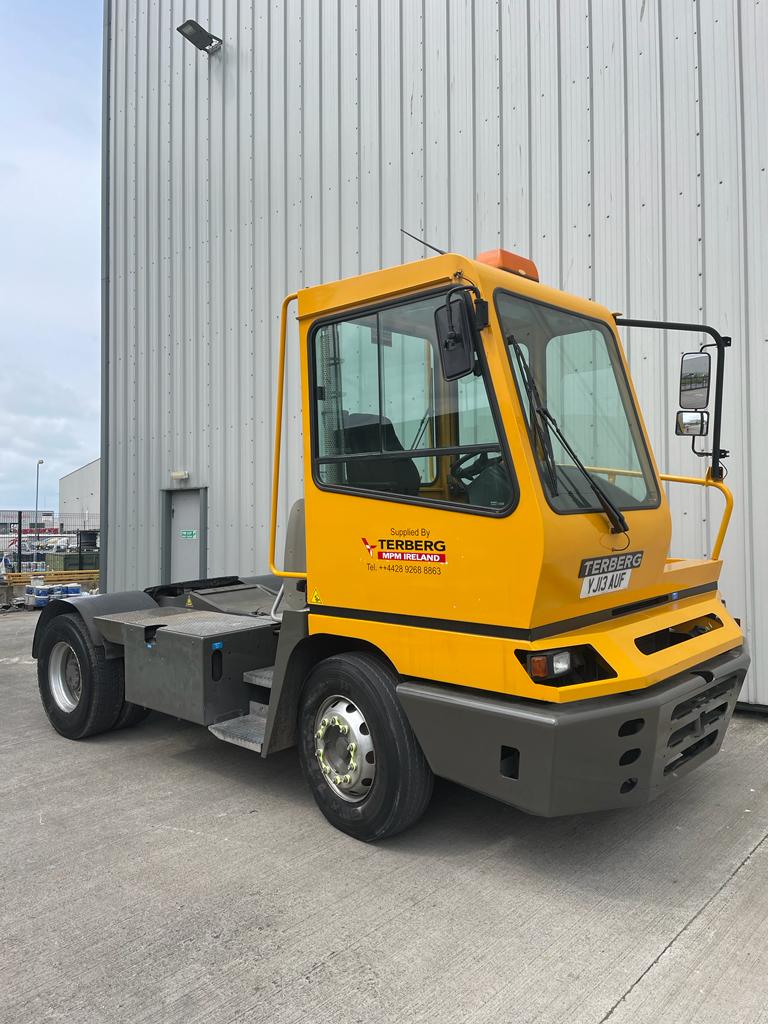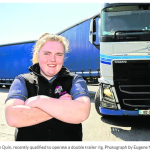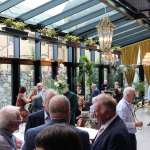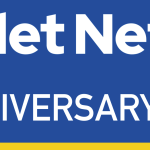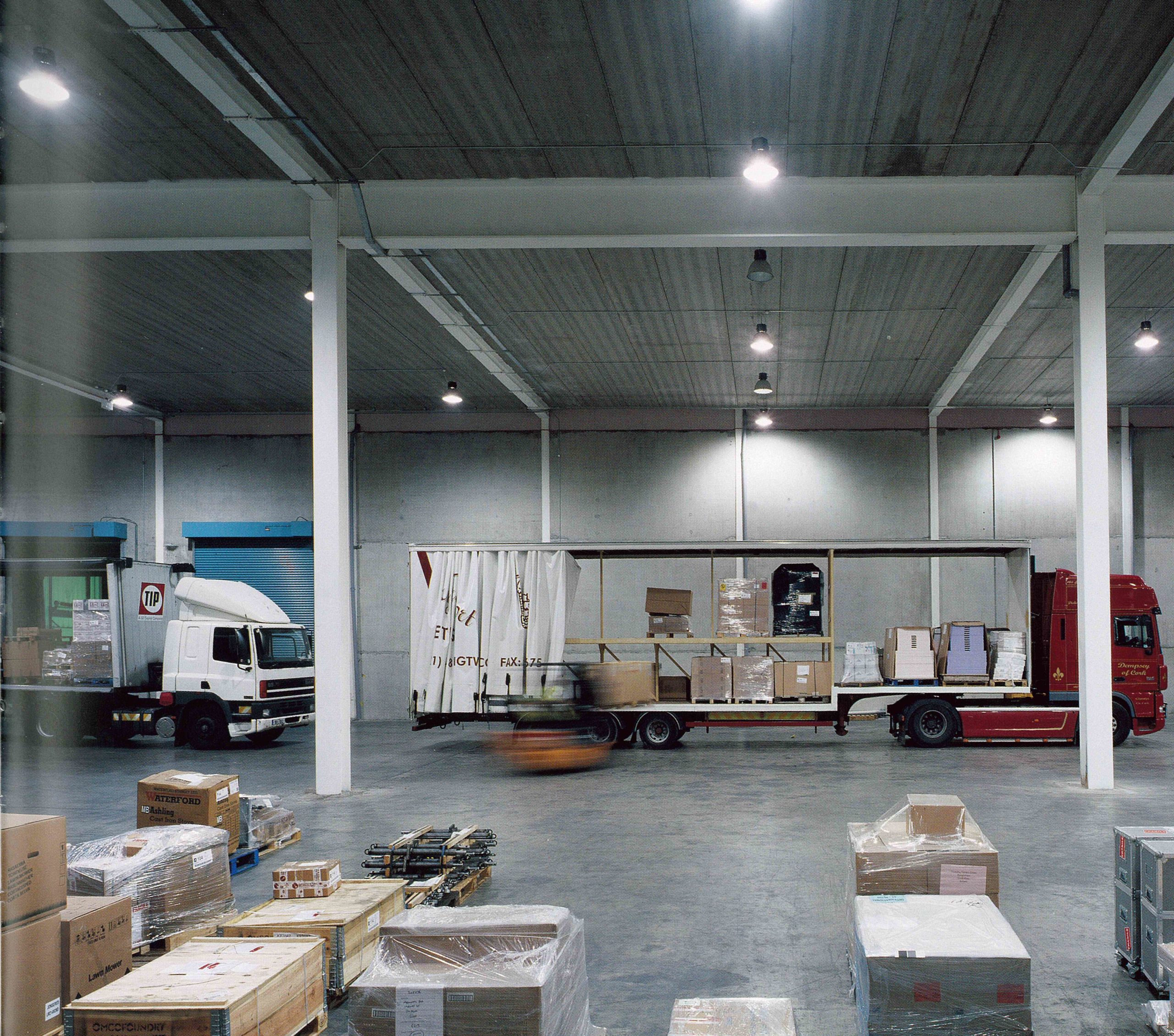At 10.00pm on the night of 8 June 2004, an articulated truck from Breffni Couriers in County Louth pulled into a purpose-built transport hub in Blanchardstown, Dublin,
with pallets for delivery nationwide the following day. The truck was off-loaded and the freight sorted by location in the 20,000 foot hub. Pallets already on the square
ground from the Dublin member of the network and destined for County Louth were loaded onto the Breffni truck. It departed into the night. The Pallet Network was underway.
Ten years ago the idea of an established haulier in Ireland entrusting the delivery of his freight to another company was revolutionary. Pallet networks had been in operation in Britain since 1992. Owen Cooke and his company, Independent Express Cargo, with depots in Dublin, Limerick, Portlaoise and Belfast, had been the first-ever Irish
member of a large British network. For some time, he had been laying the ground to create a wholly Irish-owned network and, in 2004, the circumstances were right to put his plans into action.
Owen and his newly-appointed managing director, Seamus McGowan, travelled the country, talking to proprietors of transport companies. They brought with them their formidable knowledge of the economics and benefits of working in a network. Owen especially wanted to interest the proprietors who had professional and social connections with the local manufacturing companies and their owners. Once in the network, the hauliers would be able to access a wide range of services and
so enhance their own businesses.
In April 2004, hauliers were invited to attend a meeting at the Great Southern Hotel at Dublin Airport. Owen, through his transport company, Independent Express, had already invested heavily in getting systems and facilities ready for a pallet network operation. The Independent warehouse was extended in 2003-04 at a cost of €5 million to accommodate the first hub for the proposed network. Several of those present had worked with Independent as subcontractors in the past. to modify it for the Irish market.
Owen had by now aligned himself with another UK network known as TPN, The Pallet Network. Two representatives from TPN UK, Jin Scanlon, a director who had family connections in Roscommon, and managing director Richard Eldred, attended the first meeting to explain the UK experience and to answer questions. The plan from the outset was to set up an Irish network that was linked to a UK network so that Irish provincial hauliers could provide a seamless Ireland and UK service. A branding consultant, as well as legal and financial advisers brought by some of the hauliers also attended.
Many of the standards and methods of TPN UK were adapted for the Irish network. A licence was obtained for the Irish network from Zip Zap, an IT company that had been commissioned to write network software for TPN UK. Gary Costelloe, Independent Express’ IT Director, worked with ZipZap to modify it for the Irish market.
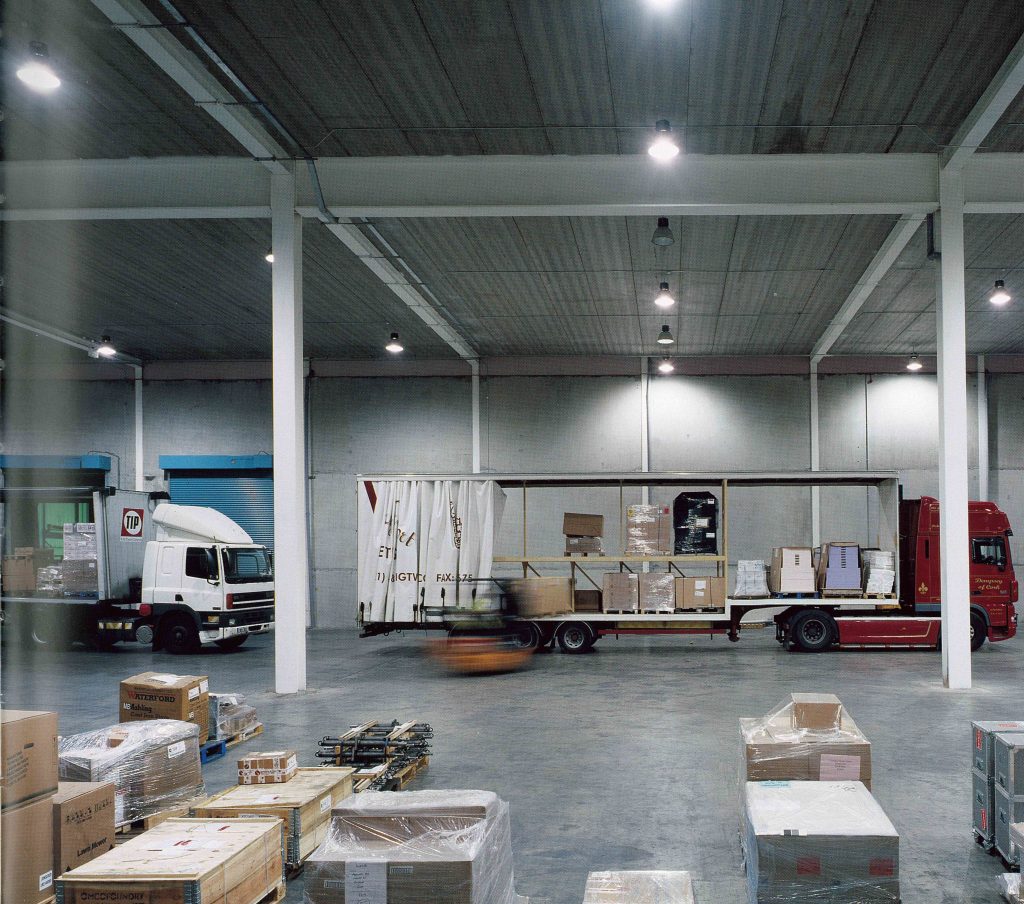
THE PALLET NETWORK – The Concept
This revolutionary model involves hauliers working together to provide each other with an overnight nationwide service for palletised freight. Each of the hauliers works
within their own territory. Members bring their freight to the sortation hub nightly and return with their fellow-members` freight for delivery in their territory.
In this way, by working together, the network member hauliers, through the TPN central warehouse and systems, provide each other with the best nationwide delivery service for palletised freight. In addition, they are keeping truck mileage down, maximising fuel efficiency, negating the need for dangerously long working days, taking large trucks off congested roads in the busy daytime hours, and addressing the environmental impact of haulage in a way that is both innovative and imaginative. The Pallet Network has been leading this revolution in Ireland. It is still unrivalled in terms of service levels, cutting edge technology and innovation.
By June 2004, fourteen hauliers had signed up for membership. At first volume was very low as it would take time to sell this new service to clients. Independent had a parcel contract with a major German freight forwarder and boxes of electronic games as well as other Dublin consignments formed much of the freight. There was a team of ten at the hub under the direction of the first night hub manager, Rory Pearce. Rory, an American had experience moving house contents up and down skyscrapers
in New York. We reckoned that if a man could handle moving a grand piano vertically up 56 floors in central New York, the pallet network would be no problem to him,’ said Seamus McGowan.
In the beginning the network was putting through fewer than 200 pallets a night, two thirds of which were generated in Dublin. All of the members had to reorganise their business, with drivers working through the night and warehouse staff on late shifts to send freight off to Dublin and on early shifts to receive the day’s deliveries. Three of the original members left the network within weeks of commencing. Independent Express filled in the gaps, and for a period of time the pink Dublin-based trucks delivered
freight in Kerry, Waterford and Longford as well as to its own catchment area. It was an expensive way for the shareholders to ensure continuity of service but it gave
the regional hauliers a chance to develop confidence in the network and to sell the concept to their clients. By early 2005, the network was handing 600 pallets
a night and, in November, 2006, the magic figure of 1,000 pallets per night was reached with only 28% coming from Dublin. The idea was catching on.
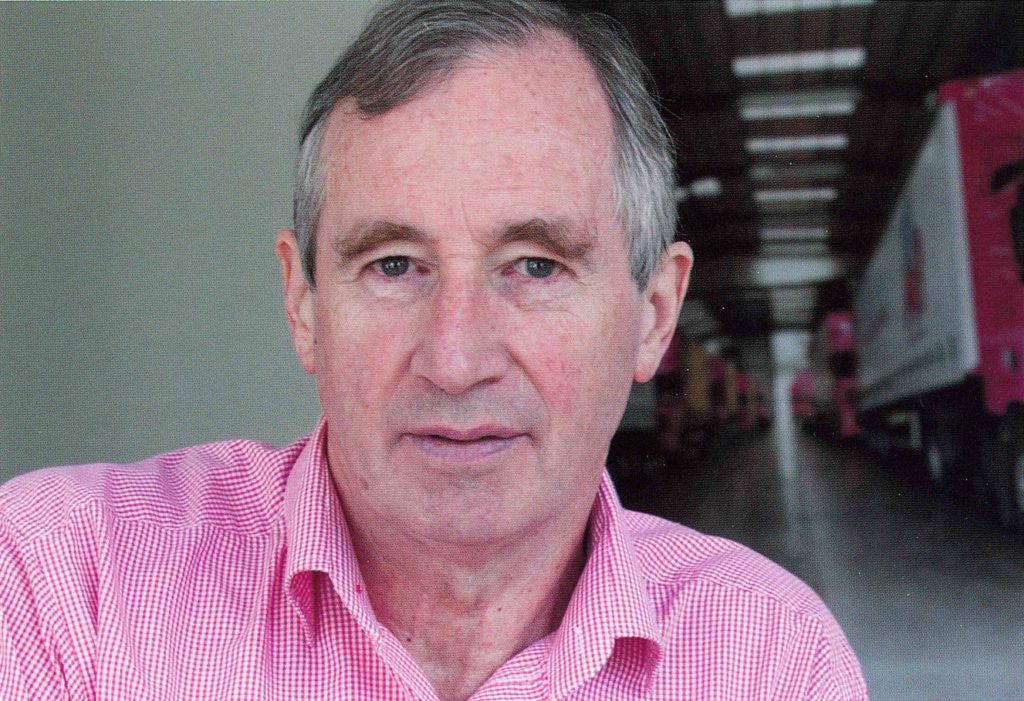
Owen Cooke, founder of Independent Express Cargo
Owen Cooke : Owen began working in transport in the late 1960s when he set up Unilever’s hanging garment transport business in Ireland. At the time CIÉ had a monopoly on transport. Licences were difficult and expensive to acquire but CIÉ did not do hanging garments, so he seized the opportunity. Companies such as Paul Wenzel and Janelle were transporting large volumes to the UK with Tibbett and Britten and, to balance the loads, Owen sold space on trucks coming back to Ireland. In order to manage the trade restrictions, he set up a bonded warehouse on the docks where the IFSC stands today. “At one point there
were fifteen clerks writing customs entries all day!”, he said. In the late 1970s, through a maze of restrictions, he masterminded the entry of Marks and Spencers into Ireland. After Unilever sold off its freight businesses, Owen established his own company, Independent Express Cargo in August 1984 and began forwarding freight between the UK and Ireland. His customers demanded an overnight, nationwide service, a challenge which appealed to him. By 1987 Independent had four depots
around the country. The freight industry had been liberalised by this stage and he used local carriers to deliver the service.
In 1993, internal European Union trade barriers were finally removed and therefore Independent could no longer depend on revenues from customs clearance. The
company had to decide whether to focus on distribution of international freight or national distribution and it chose the latter.
In 1994, Owen became the Irish member of one of the earlier pallet networks set up in the UK. In 1999 he moved to a large site in north Dublin, buying four acres of cornfields with the intention of expanding later. Detailed discussions about developing an Irish pallet network got underway in 2003.
A year later, with Owen Cooke as chairman, The Pallet Network as a wholly Irish-owned and operated enterprise was launched, and Independent Express became the Dublin member.
Our mission statement is to consistently deliver our customers’ freight intact and provide proof of delivery in accordance with the agreed service levels and to keep
our customers informed when agreed service levels cannot be achieved.
Our vision is to be recognised as the best carrier of palletised freight in Ireland
Our core values are:
– To place customer needs at the core of all our activities
– Continuous improvement in our services
– To be the most innovative provider of freight services
– To be honest and fair to all stakeholders
– To measure success through sustainable profit
– To treat our staff in a fair and consistent manner.
– Communication is respect
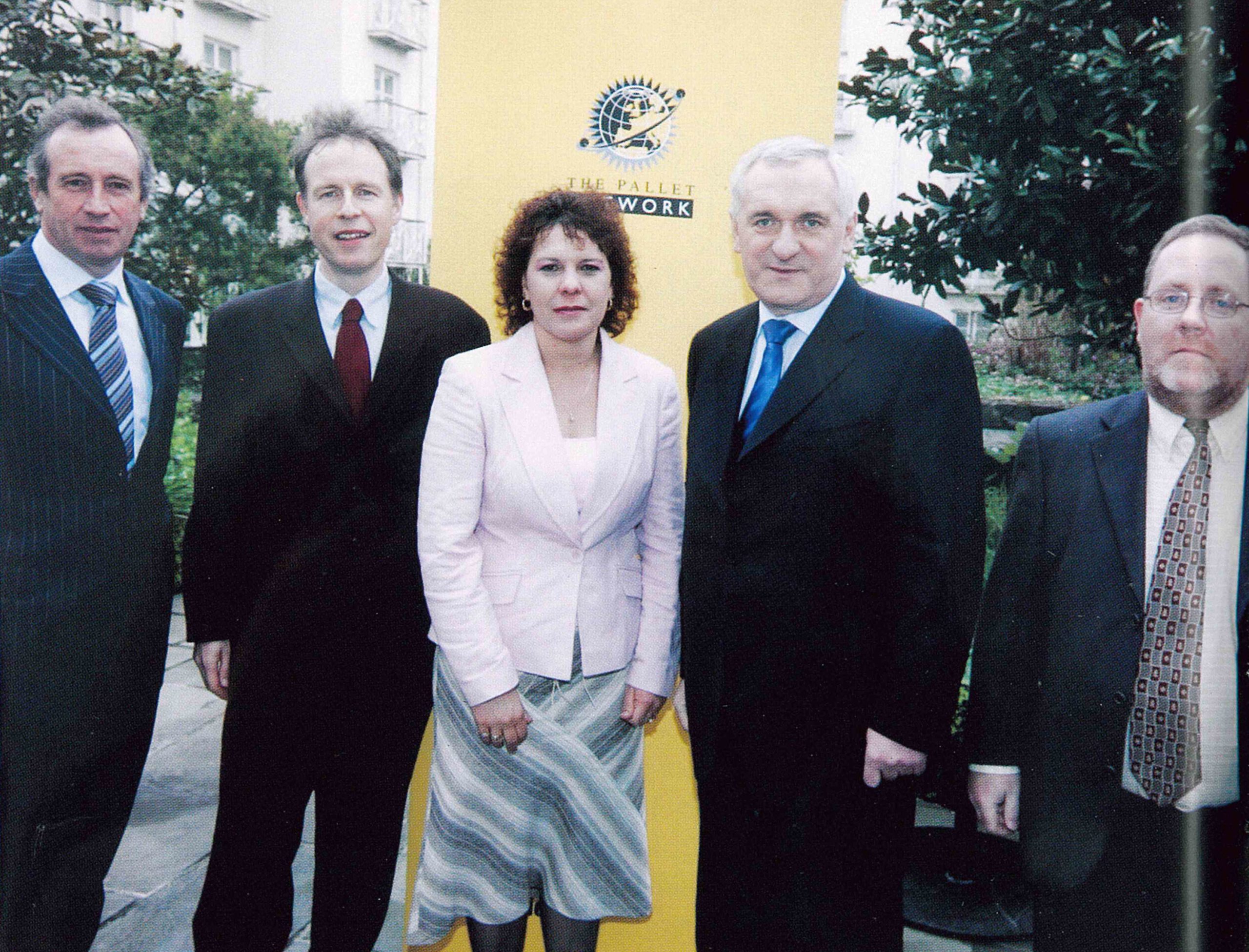
Selling The Network
TPN management developed a marketing strategy to help members to sell a nationwide, overnight distribution service to their clients. A professionally-produced
brochure describing the network services and how the network worked was produced and distributed to all members. Red Dog Design in Dublin was commissioned to
design the distinctive TPN Ireland logo and members were given clear guidelines on how to use it in conjunction with their own logos on truck liveries, Databases
were bought centrally to help members identify potential local customers. In 2005, the website tpn.ie went live.
In March 2005, journalist Jim Aughney wrote about the network in the business section of the Irish Independent. He described graphically how a regional haulier who approached the capital via the Red Cow Roundabout could spend up to 15 hours in his truck in order to make deliveries to three Dublin addresses in one day. The article went on to describe how The Pallet Network worked and the efficiencies of the system. For members, recognition in a national daily newspaper lent weight to their sales pitches to clients. A month later, the then Taoiseach, Bertie Ahern, met the TPN depot principals at a function in the Merrion Hotel for the official launch of the network. Later that year Corporate Reputations, a public engaged to generate relations company was localised publicity for the members and to build brand recognition. Whenever
the opportunity arose, for example through the arrival of a new member or winning awards, press releases were customised for each member and sent to their local newspaper and radio station.
It was a complex strategy but necessary if the concept of delivering freight through TPN was to become commonplace in Ireland. (In 2014, an estimated 20% of pallets in the domestic market are currently being shipped through a pallet network; in the UK, where the network model has been in operation since 1992, the figure is closer to 40%.)
Co-Operation And Trust
The strength and success of the network lay in each member haulier’s ability to work with fellow members as a team. The principals of each depot had set up their own businesses and were used to being in charge. Their fleets, client base and general operations differed in size and volume. The challenge was to bring them all together
to create a network that operated as one entity to the same consistently high standard for every collection and delivery.
There were two non-negotiable rules while members could sell their services anywhere in the country, they were not permitted to poach a fellow member’s clients; and members could only be part of one pallet network in Ireland. In the hub all members freight was treated equally. Pressure to create a tiered system based on size and input was resisted. The network could only prosper if the growth of each member was supported and any uneven growth would have weakened a member, which in turn could have reduced the quality of service in one area of the country and ultimately damaged the network.
Members met regularly to thrash out issues, discuss problems and share ideas. The lively and often frank meetings were an opportunity for the principals to get to know each other and develop a working relationship. In the early years, these meetings were held four times a year. Later on the meetings were reduced to three a year. To date, 36 such meetings have taken place and they have served to unite the network as a cohesive service provider.
So critical was the issue of achieving a high quality service that within six months of commencing operations a survey was conducted in which each member was asked to assess the quality of the service being provided by the other members. The results were collated and each depot’s average score was released – leading to more frank discussion at the next meeting of principals!
In 2005, Gary Costelloe, the IT Director developed a database that allowed The Pallet Network to measure key performance indicators. The first measure examined was Proof of Delivery (POD). It emerged that only 67% of the PODs were up on the system by the third day after due delivery date. It was not because the pallets had not been delivered but because the local attitude was, ‘Sure, it’s been delivered, it’s only a pallet!’ A parcel of little worth was more likely to have a rapid POD record than a whole pallet of goods. In order to encourage a change of attitude, TPN management began to publish weekly league tables from Gary’s extracted data. Within six months, PODs were on file in 99% of cases after two days. ‘The league tables were extended to monitor on time delivery, scanning, and input volumes, and remain in place to the present day. Today the results from three league tables, together with an annual TPN Members Survey underpin the annual TPN Awards, which are held each December
and are a highlight of the TPN year
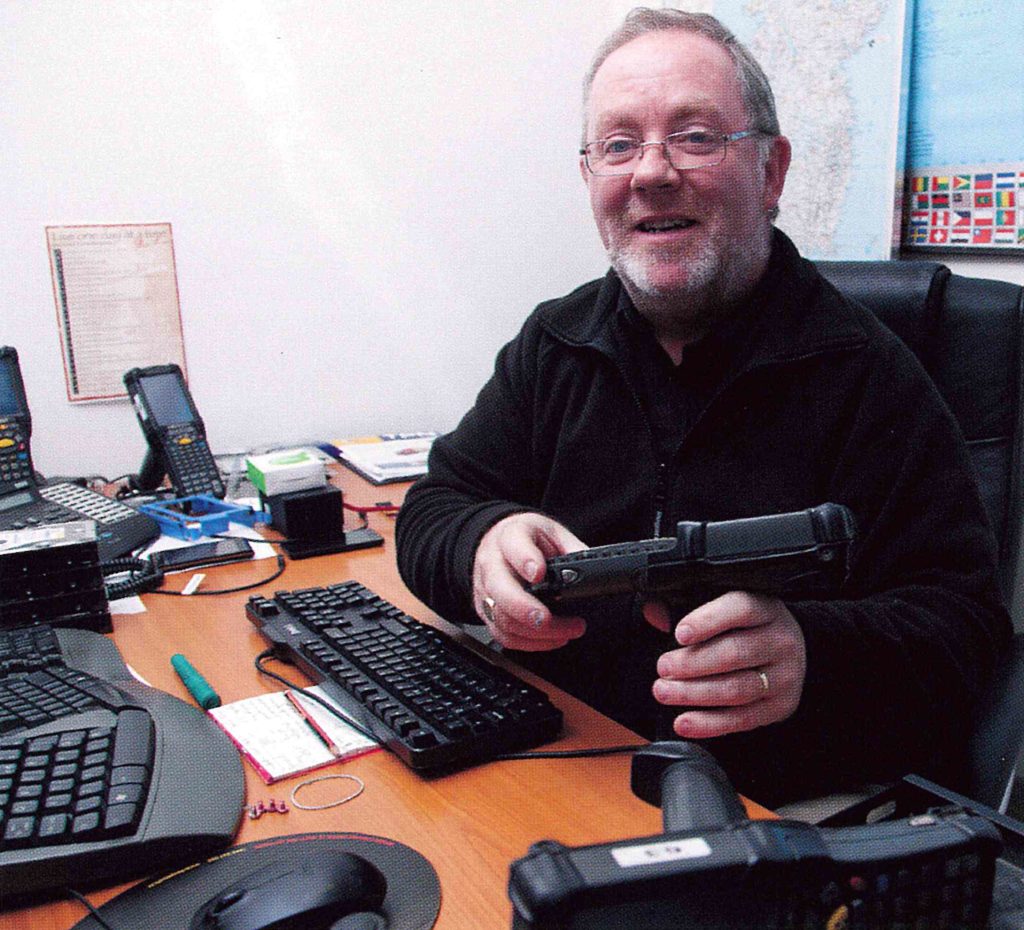
Gary Costelloe, IT director, TPN
Gary Costelloe: Gary began working in B&l in 1975 in the accounts department and developed his interest in IT as B&I was one of the few computerised companies in Ireland at that time. In 1988 he joined Wang Computers as a systems analyst and was given responsibility for developing distribution systems.
In 1995, he joined Independent Express Cargo. The company was computerised when Gary arrived. Scanning of PODs started in 1996 and in 1998 he began to write in-house software to control freight movements. The Pallet Network created a new set of IT challenges. The IT system, originally designed for the UK, used postcodes to
identify the delivery location. Gary created a unique postcode system based on car registration numbers, which the TPN system could use for the Irish market. In
the early years, poor connections with depots that had to use dial-up broadband interfered with getting the best value out of the technology but, bit by bit, the
situation has improved. In 2007 Gary produced a module that members could use to invoice their customers. The same year he introduced barcode scanning to TPN, something that was later introduced to TPN UK. Gary continues to oversee the IT development of the network, ably assisted by Tomasz Lawecki, formerly of the Warsaw State Opera IT department, and Tadhg Cooke, a recorded singer songwriter.
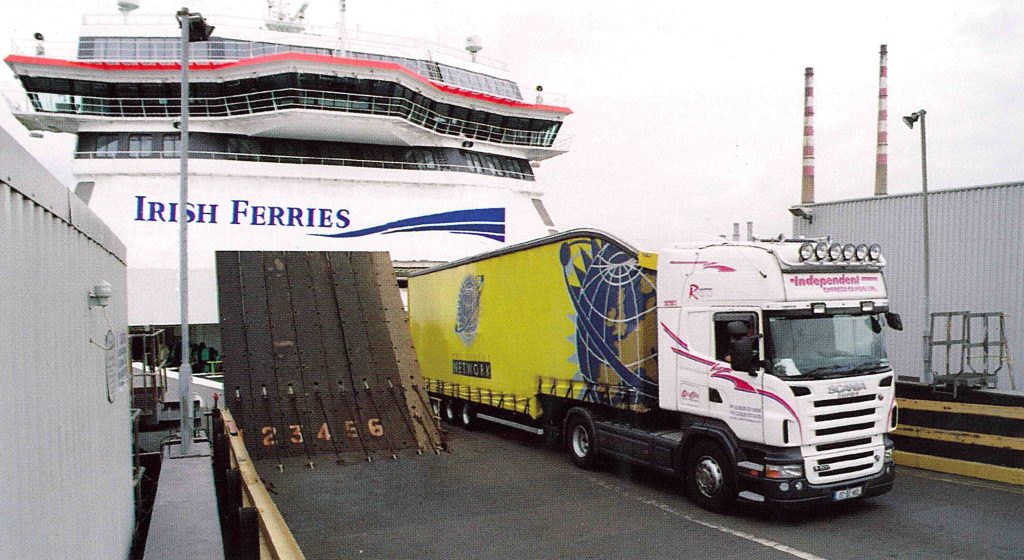
Ireland – UK Link
One of the unique selling points of joining TPN Ireland was to get access to the British pallet network, TPN UK. The core values and standards of operation in this network were similar to those in Ireland and it used the same IT system so manifests, pallet movements and PODs were synchronised. In the early years having a fully integrated software
system across two networks in different countries was quite an achievement.
Every night three double-deck trailers leave the Irish hub, carrying freight to and from the UK pallet network hub. This trunking has been operated by Sligo-based haulier Shane Cawley. In 2012, Shane featured in a six-part documentary series on RTÉ Television about life as a long-haul trucker. Shane carries on a family tradition,
as his uncle Ray Cawley worked with Owen Cooke in the early days of Independent Express Cargo, and his brother Rod now operates the TPN Sligo depot.

